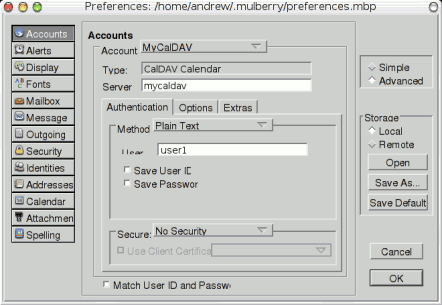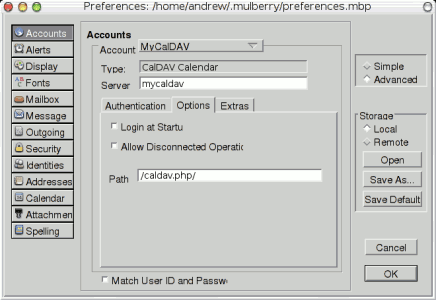Mulberry
Mulberry is the most well-behaved of the applications I have been able to use. It does have some bugs, however, and a particular annoyance around it's use of non-standard names for time zones. Mulberry is the only client I have used so far which can issue a MKCALENDAR command or which will display a hierarchy of calendars from a single configured URL, dicovering the calendars through recursive PROPFIND requests.
- Select "Preferences" from the "File" menu.
- Choose the "Accounts" tab
- Select "New" from the "Account" drop-down and a "Create New Account" dialog will appear.
- Enter a name for the account, choose "CalDAV Calendar" for the type and click "OK"
- In the "Server" field enter the domain name of your CalDAV server, such as "calendar.example.net"
- In the "Authentication" pane of the "Accounts" tab, enter your username.

- In the "Options" pane of the "Accounts" tab, enter the path, which should be "/caldav.php/"

- "OK" the preferences dialog
- A list of the users and resources which you are allowed to access should appear. Some may contain calendars.
- If you don't already have a calendar for your own user, ensure your username is highlighted and choose "Create" from the "Calendar" menu.
- Once you have a calendar created, you need to subscribe to it. One way is to right-click on it and choose 'Subscribe'.
Caveats
Note that Mulberry has a complex user interface. When I wrote this I went back into Mulberry and initially thought that DAViCal had regressed somewhat and that these instructions didn't exactly work... :-) It turned out that these instructions worked just fine when I followed them to the letter the next day. Go figure. I think I need to record some screenshots of this one...
If you're using Mulberry on Linux you probably have really crappy fonts purporting to be Helvetica, Times and Courier - go into File -> Preferences -> Fonts and change them to something nicer as soon as possible. Apple paid a lot of money to license those fonts, but few Linux users or distributors do.
